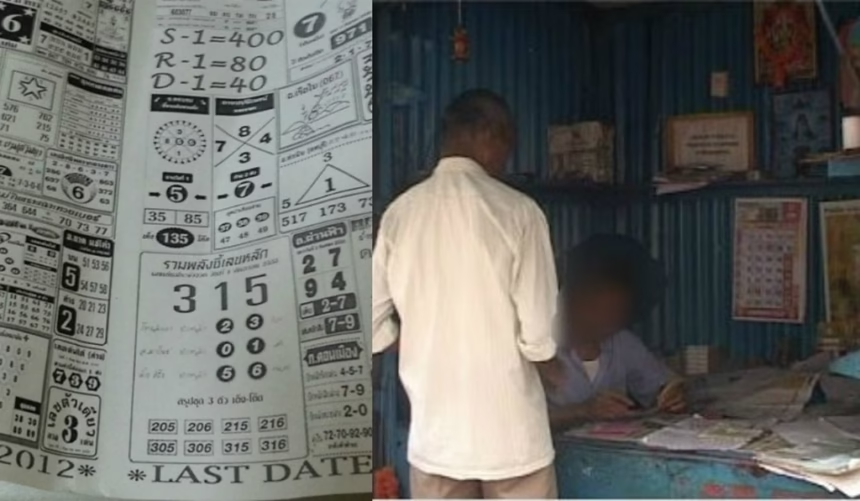MUMBAI, India – In the tight, crowded lanes of Mumbai’s suburbs, where small shops, tea stalls, and crowded chawls set the rhythm of life, Mumbai Matka keeps running in the background. This old numbers game still stands as one of India’s most stubborn illegal gambling rackets.
It survives repeated police raids under the outdated but still powerful Public Gambling Act of 1867, a colonial law that refuses to fade away.
What started in the city’s cotton trade decades ago has grown from a small-time betting habit into a multi-crore underworld operation. It feeds everything from Bollywood fantasies to organised crime.
From the 1960s to today, Mumbai Matka shows how prohibition can push an activity deeper underground instead of wiping it out. As police turn to digital tracking, data tools, and better coordination between states, a larger question hangs in the air. Can a law written 158 years ago ever truly shut down this stubborn game of chance?
From Cotton Mills to Number Rackets: How Matka Began
The story of Mumbai Matka, usually just called “Matka” (Hindi for an earthen pot), starts in the busy textile markets of old Bombay. In the 1950s and early 1960s, workers in cotton mills and small-time gamblers started placing bets on the opening and closing rates of cotton.
The rates came from the New York Cotton Exchange and the Bombay Cotton Exchange, sent over teleprinters.
This betting practice, known as “Anchoring” or “Ankada Jugar”, focused on price movements. It began as an informal side activity for workers looking for extra excitement and a chance to earn quick money.
The modern form of Matka took shape in 1962. Kalyanji Bhagat, a Gujarati farmer who turned to business, set up a more organised version. His “Worli Matka” used an actual earthen pot filled with playing cards to draw numbers. He held daily draws, and the game soon caught on among the working class, who saw it as an easy way to try their luck.
By 1964, another figure, Ratan Khatri, entered the field. He launched “Main Ratan Matka” and pushed the game to new heights. Soon, people were calling him the “Matka King”. Khatri refined the rules. Punters picked three numbers from 0 to 9; the three were added up to form a final digit, and payouts followed a fixed structure. Single ank (single digit) bets paid up to 1:9, while jodi (pair) bets could pay up to 1:150.
During the 1970s and 1980s, Matka spread across Mumbai. It found space in slums, chawls, street corners, and even middle-class and wealthy neighbourhoods. At its peak, the market is believed to have turned over more than ₹500 crore a year, which would run into billions in current value. Thousands worked in the chain as bookies, runners, collectors, and part of larger syndicates.
Matka became more than a simple gamble. It slipped into popular culture, inspired films like Dharmatma (1975), and fed the city’s criminal networks. Underworld figures such as Haji Mastan and Karim Lala were widely believed to use Matka money to support smuggling, protection rackets, and other illegal businesses.
The main attraction was how easy it was to join. A person could bet with as little as ₹1 and dream of a huge payout. That sense of access also had a darker side. Many got hooked, fell into deep debt, and faced harassment or violence. Police records began to fill with Matka-related fights, threats, and family disputes. Some homes broke apart under the pressure, and there were cases of suicide linked to gambling losses.
A Colonial Law in a Modern City: The Public Gambling Act of 1867
The backbone of India’s anti-gambling laws is still the Public Gambling Act of 1867, passed by the British to control what they saw as public disorder. The Act targets “common gaming houses” and makes it a crime to own or run such a place. Punishment includes fines of up to ₹200 or up to three months in jail. Those found running the houses can face higher fines up to ₹500 and as much as six months inside.
The law makes a clear exception for games that involve skill, like certain card games or sports. But it treats lotteries and betting on chance as illegal activities and clubs them under a broad idea of wrongdoing.
After Independence, many states took this Act and adapted it to their own rules. In Maharashtra, the Bombay Prevention of Gambling Act, 1887, strengthened the older law. It gave police the power to raid without a warrant and to seize property linked to gambling.
Even so, the 1867 Act is vague in places. It speaks in general terms about “gaming” but says nothing about virtual platforms, online betting, or digital wallets. That gap has helped Matka survive.
When police started targeting physical Matka dens in the 1990s, operators shifted to telephone-based betting. After 2010, most major Matka operations moved again, this time to websites, SMS services, and smartphone apps.
Many legal experts point out that the law now feels old and clumsy. Advocate Meera Desai calls it “a Victorian-era tool fighting a 21st-century hydra”. At the same time, not all states treat gambling the same way. Goa, Sikkim, and Nagaland allow certain lotteries and gaming activities, which leaves the country with a patchwork approach.
Even with these gaps, the Public Gambling Act still gives police a weapon to raid Matka operations. The result is a constant cycle. Authorities clamp down, rackets shut shop or lie low, then reopen under new names or in new formats.
A Constant Crackdown: Police vs Matka Syndicates
Maharashtra Police, along with the Crime Branch and Cyber Cell, have been locked in a long and tense struggle with Matka operators. The battle took on a sharper edge in the 1990s, especially after the 1993 Mumbai blasts exposed deep links between the underworld and illegal betting.
In 1995, a large operation closed more than 1,000 Matka dens across the city and suburbs. Police seized close to ₹50 crore in cash and assets. For a while, Matka activity on the streets dipped, but it soon reappeared in new forms.
With the spread of the internet and mobile phones in the 2000s, Matka shifted again. Websites such as matkaone.com and many copycats began publishing “live” results and accepting bets. In response, enforcement agencies started using the Information Technology Act, 2000, to block sites, track IP addresses, and follow money trails.
In 2014, Mumbai Police launched “Operation Matka”. Over the course of the campaign, more than 500 operators were arrested. Investigators froze bank accounts worth around ₹100 crore and picked up records that showed how deeply Matka money had entered the city’s informal economy.
Recent cases show how far both sides have gone. In 2023, the Economic Offences Wing (EOW) said it had broken a ₹1,200 crore syndicate with ties to Dubai. Officers arrested 22 suspects and found strong links between Matka betting, hawala routes, and offshore accounts.
Drones, call data analysis, and AI-based tools are now used to track patterns in cash flow and betting activity. A senior IPS officer, who did not want to be named, said, “We use data mining to trace the hawala networks that keep Matka funded.”
Coordination across state borders has become just as important. Towns in Gujarat, Rajasthan, and Uttar Pradesh act as feeder hubs for Mumbai’s Matka trade. In 2024, a joint operation with the Gujarat Anti-Terrorist Squad (ATS) shut down a Rajkot-based set-up.
Police seized servers, mobile devices, and cryptocurrencies worth about ₹300 crore. The Enforcement Directorate (ED) followed up with money laundering cases under the Prevention of Money Laundering Act (PMLA) and moved to attach properties linked to the racket.
Yet the market adapts quickly. Operators now flock to WhatsApp groups, Telegram channels, and a range of SATTA apps such as “Kalyan Matka Pro”. These channels are harder to monitor and can reappear after blocks.
Investigators estimate that daily Matka turnover across India lies somewhere between ₹500 and ₹1,000 crore. Around 40 per cent of this is thought to come from Mumbai and its surrounding regions. One police officer put it bluntly: “For every den we raid, two new ones appear online.”
Big Names, Big Falls: When Matka Bosses Are Caught
The history of Matka is filled with dramatic arrests and faded empires. Ratan Khatri, the original Matka King, faced many arrests in the 1970s and 1980s. His detention under the Terrorist and Disruptive Activities (Prevention) Act (TADA) in 1995, on suspicion of links to the blast cases, marked a key moment.
He still managed to avoid major convictions and lived out his final years quietly, passing away in 2020.
Later, police turned their focus to his successors. In 2005, Suresh Bhagat, the son of Kalyanji Bhagat, was held with around ₹10 crore in cash. He jumped bail and fled to Thailand, but after several years on the run, he was brought back to India in 2012 and faced trial.
A newer face, Parag Shah, came under the spotlight in 2018. Based in Dubai, he ran a network that handled an estimated ₹500 crore. His operation used celebrity links from Bollywood for soft promotion and to gain trust among punters.
A raid on his Andheri office by Mumbai Police uncovered 15 key associates and detailed ledgers that listed more than 50,000 regular bettors. Shah was arrested on his return to India and later received a five-year sentence under the Gambling Act.
By 2021, attention shifted to an unlikely figure, the so-called “Matka Queen” Jaya Patel. Working out of Nagpur, she ran an app-driven betting network that brought in about ₹800 crore a year. The ED moved in and seized assets worth around ₹200 crore, including flats in Mumbai and several luxury cars. Her case also showed that women had begun taking more central roles in illegal betting operations.
In 2023, authorities claimed their biggest success yet. Dubai-based operator Vikram Singhania, said to have ties to remnants of Dawood Ibrahim’s D-Company, was caught under a joint India-UAE operation. Investigators said they traced his Bitcoin wallets using cyber forensics and secured Interpol red notices. Assets worth roughly ₹1,500 crore were seized or frozen.
Most recently, in October 2025, the Mumbai Crime Branch announced “Operation Clean Sweep”. Officers arrested 35 people, including alleged kingpin Raju Verma. His setup in Thane used AI tools to tweak result patterns and avoid detection. Police recovered around ₹150 crore in cash and assets, several servers, and a fleet of high-end SUVs. “This sends a message,” Police Commissioner Vivek Phansalkar told reporters after the raids.
These big arrests shake the system for a time, but they rarely destroy it. When one boss falls, mid-level operators break away, start smaller hubs, and compete among themselves. That creates new turf wars. In 2024 alone, Mumbai recorded at least three murders tied directly to Matka disputes.
Human Cost and Hidden Money: The Impact of Matka
Behind the large sums and dramatic raids lies a quieter tragedy. Matka addiction eats into households, savings, and mental health. A 2024 study by the National Commission for Protection of Child Rights (NCPCR) estimated around five lakh regular gambling addicts in Maharashtra, with almost 20 per cent of them under the age of 25.
When people lose heavily, many turn to informal lenders and end up paying very high interest. Threats and violence follow when they fail to repay. “I have seen families sell their homes, cars, even jewellery just to clear dues or chase one last bet,” says Dr Priya Mehta, a counsellor at Rehab India.
On the money side, Matka acts as a large drain into the black economy. Profits rarely pass through formal banks. Instead, syndicates move cash through hawala channels, invest in benami property, or convert it into gold and foreign currency. The government loses tax revenue, and the money often feeds back into other illegal trades.
At the same time, Matka does provide informal jobs. Runners, who carry slips and cash, typically earn ₹500 to ₹1,000 a day. Small bookies and agents also make a steady living in areas where regular jobs are scarce. Because of this, some argue that legalisation and regulation could bring the market above ground, create safer rules, and generate tax income, similar to state lotteries or regulated casinos.
What Comes Next: Reform, Control, or Something in Between?
India’s debate over gambling regulation has grown louder in recent years. In 2023, the Law Commission suggested a tightly controlled model for legal betting and casinos, with strong safeguards and tax structures. Even so, Matka remains illegal under existing laws, and no formal move has been made to legitimise it.
A draft Gambling Regulation Bill, which could update and unify gaming laws, still lies pending in Parliament. In the meantime, states like Maharashtra are trying new tools rather than new laws. The state’s 2025 budget set aside ₹50 crore to upgrade anti-gambling technology. The plan includes better cyber tracking, staff training, and links between financial watchdogs and local police.
Relying on the old Public Gambling Act, 1867, to manage online Matka looks less realistic each year. Digital betting crosses state borders with ease, and local raids alone are not enough. Many experts believe India will need new central laws that speak directly to online gambling, payment gateways, and cross-border syndicates.
Until that happens, enforcement will likely swing between large crackdowns and periods of uneasy quiet. The raids continue, operators regroup, and the cycle repeats. In the back alleys of Mumbai, the matka number slips still move from hand to hand, and smartphones ping with daily results, keeping the game alive.
There are small signs of resistance from within communities. In Dharavi and other dense neighbourhoods, local groups run workshops to warn residents about gambling traps. “Awareness is our strongest weapon,” says Sanjay Gupta, who runs an NGO that works with young people at risk of addiction.
In the end, Mumbai Matka is a story about chance, greed, and the gap between people’s dreams and their reality. As long as that gap feels wide, and quick money looks easier than hard work, the old earthen pot of Matka is likely to keep spinning in the shadows.














